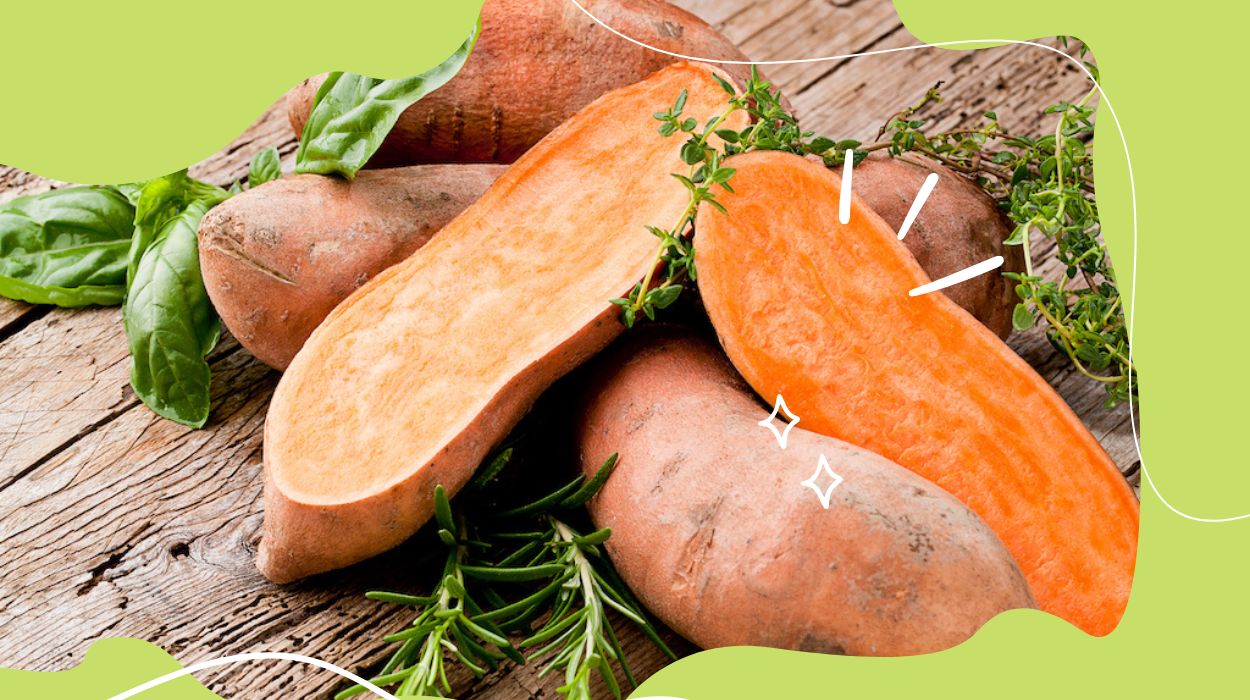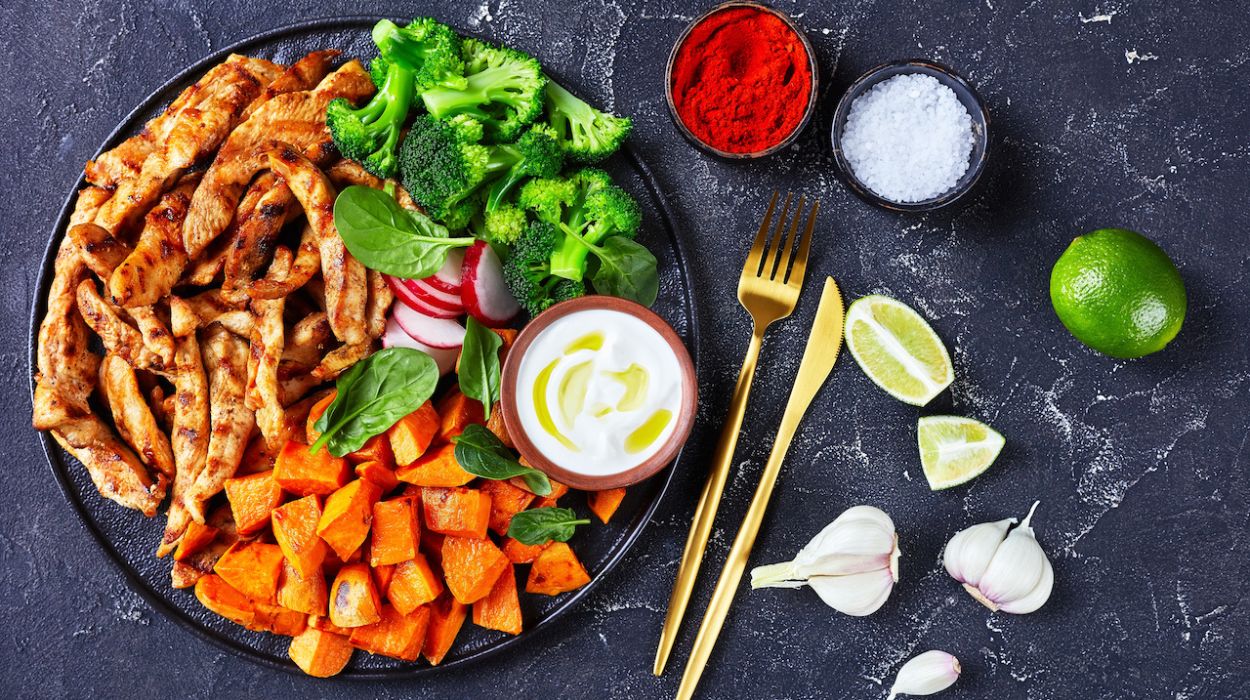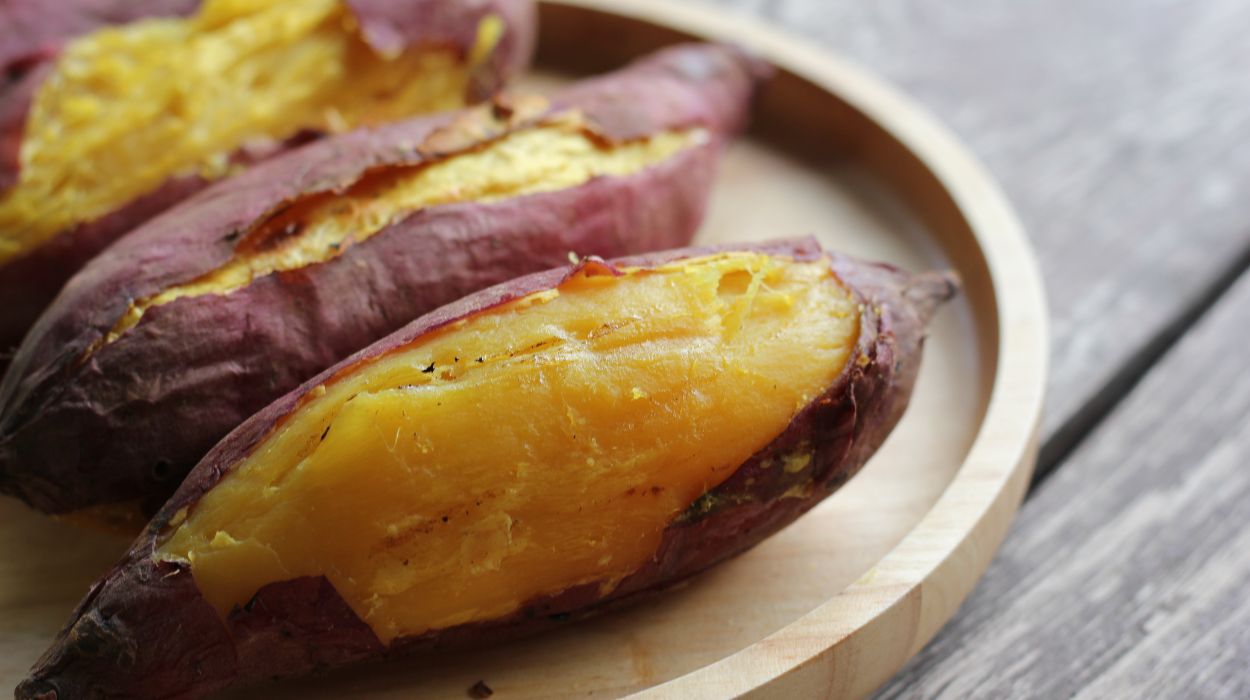 Expert's opinion
Expert's opinion
Expert's opinion
The article is a subjective view on this topic written by writers specializing in medical writing.
It may reflect on a personal journey surrounding struggles with an illness or medical condition, involve product comparisons, diet considerations, or other health-related opinions.
Although the view is entirely that of the writer, it is based on academic experiences and scientific research they have conducted; it is fact-checked by a team of degreed medical experts, and validated by sources attached to the article.
The numbers in parenthesis (1,2,3) will take you to clickable links to related scientific papers.
Are Sweet Potatoes Good For Weight Loss 2024? Benefits & Recipes

Are sweet potatoes good for weight loss? It’s a surprising question for such a starchy food. They look slightly more nutritious than potatoes, but that’s not saying much.
And yet, eating sweet potatoes is one of the best ways for weight loss! They’re super rich in beta-carotene and dietary fiber. They also promote satiety or feeling full and satisfied, and they do it with much less pure starch than regular potatoes.
For all that, though, can potatoes actually help you lose weight? The answer is yes, but you need balance. Here’s what you need to know.
Is Sweet Potato Good For Weight Loss?
Like most things, it depends on how you use it. One study review[1] found that a high-fiber diet, in which sweet potatoes could easily be a large part, helped people lose up to five percent of their weight in 12 months.
On the other hand, sweet potatoes are still food that has high-fiber carbs and is not likely to solve all your problems independently. It’s just like how certain fruits can aid weight loss, but eating nothing but high-sugar fruit isn’t a cure-all either.
Benefits Of Sweet Potatoes For Weight Loss
The main component sweet potatoes bring to the table is fiber. Fiber is the nutritional term for vegetable compounds that your body cannot digest, like cellulose. It helps you feel full without adding calories and keeps your digestion running smoothly.
Recent studies[2] have shown that fiber can help people lose weight by acting as an appetite suppressant. It’s safer than most artificial appetite suppressants because it works much less dramatically but can lead to substantial weight loss.
Sweet potatoes are also full of water – it makes up slightly over 77% of a sweet potato’s mass, according to the USDA[3]. If cooked, sweet potato would lose a lot of that water, but what’s left would also contribute to feelings of fullness without adding calories.
A full sweet potato only contains 112 calories or about five percent (one-twentieth) of your daily calorie intake. Yet it can make up the majority of a meal. It also contains only 26 grams of carbs, about a tenth of the recommended intake.
In other words, sweet potatoes can act as a filler, satisfying your hunger without filling your calorie intake. This makes them very good for calorie-restriction diets.
Consuming a diet filled with high-volume, low-calorie food is an effortless way to diet and won’t make you feel as hungry as many other choices, but it can come with its own problems. You just have to look at the confusing and ineffective potato diet to see what can happen when you take the idea too far. Moderation is key.
You might also be wondering, are sweet potatoes good for the keto diet? Unfortunately, the answer is no. Keto stands for ketosis[4], which is the medical term for your body burning fat instead of carbohydrates.
Most of the time, people get their energy through carbohydrates. On the keto diet, however, the goal is to get much more fat and protein and fewer carbs. Sweet potatoes have a lot of carbs and not enough fat to qualify for the keto diet. So, unfortunately, they don’t fit well with that lifestyle.
How To Cook Sweet Potatoes For Weight Loss?
There are many excellent ways for consuming sweet potatoes in your healthy weight-loss diet. Studies have shown[5] that people eat healthier when they know how to prepare healthy food, so it’s essential to learn how to incorporate foods that are healthy individually into complete meals.

Smoothies
One of the most fun ways to use sweet potato is in a smoothie. Sweet potatoes give a smoothie an earthy, rich flavor, a thick, creamy texture, and a delightful orange color. Try them with pumpkin for an extra boost of fiber and vitamin A, and throw in a little cinnamon, nutmeg, and allspice for that delicious fall flavor.
Salads
You can also try sweet potato in a salad. Small cubes tossed with kale, and a little oil and vinegar make a great combination. Add nuts to the salad mixture to get a little crunch! You can also try adding avocado for extra healthy nutrition and great taste.
Baked Sweet Potatoes
The simplest way to have a sweet potato is to roast it like a baked potato. Resist the temptation to add butter or brown sugar, and instead, drizzle it with a bit of olive or avocado oil and garnish with nuts.
Roasted Sweet Potato
You can also roast sweet potatoes in small cubes for a sweet, slightly crunchy side dish. You can even just eat sweet potato as a healthy snack. They could be helpful to keep around if you often feel tempted by the ease of junk food.
Pancakes
Let’s not forget the sweet potato pancakes. They’re not usually made in a healthy way, but it’s easy to tweak the recipe. Use whole wheat or rice flour instead of white or all-purpose, cut out the sugar, and avoid putting butter or maple syrup on top. Easy and delicious!
Boiled Potatoes

The healthiest way to eat sweet potatoes is to boil them, which lowers their glycemic index. Boiled sweet potato is the healthiest preparation that’s been studied. Boiled sweet potatoes are great served like mashed potatoes with a bit of milk and a little olive oil. Salt also helps to really bring out their sweetness by contrast.
If you’re looking for a fun activity that also contributes to your healthy diet, sweet potatoes are also very easy to grow. They’ll grow in most climates and are hardy enough to survive the occasional missed watering. Sweet potatoes are susceptible to frost, so plant them in late spring. They only take about 90 days, or three months, to grow.
You can expect to harvest between three and five sweet potatoes per plant, which is about as much as you can eat in a week. If you want more than that, stagger the plantings slightly – plant one sweet potato a week to harvest one plant each week. They need to be planted a foot apart.
Sweet Potatoes And Potatoes
The comparison to regular potatoes is hard to avoid. Sweet potatoes seem very similar to regular potatoes. They’re just another starchy root vegetable but slightly healthier. This comparison is wrong, though. Potatoes and sweet potatoes are actually entirely different, completely unrelated forms of root vegetables from different plant families.
In fact, potatoes are in the nightshade family, while sweet potatoes are more closely related to morning glories. So the name “sweet potato” is really just extremely misleading.
The best way to use sweet potatoes to lose weight is to supplement them with many other things. Eat lots of vegetables, protein, and fruit. If you need help getting enough fruits and vegetables into your diet, you can try a supplement, but nothing compares to the real thing.
If you want to pursue a high-fiber diet for weight loss, use other noted high-fiber foods in addition to sweet potato. Beans, broccoli, avocados, apples, and whole grains are a few other things you can try to use on your weight loss journey.
On the other hand, since sweet potatoes contain a lot of carbohydrates without much fat or protein; thus, they could cause your blood sugar to spike. So pay attention to your overall diet, ensuring it is balanced with other low-glycemic, low-carb foods, especially if you already have issues with your blood sugar.
Also, avoid preparing your sweet potatoes in the popular, high-sugar ways. For example, a standard sweet potato casserole stuffed with brown sugar and marshmallows will definitely not help you lose weight.
The Bottom Line
Sweet potatoes are high in fiber, indigestible material that can make you feel full with fewer calories. This helps you eat less and lose weight. But they’re also relatively high in carbohydrates and can give you too much starch.
Eat sweet potatoes in moderation as part of balanced, healthy meals, and support them with other types of high-fiber foods, such as whole grains and vegetables. You’re also more likely to lose weight with healthy exercise, good sleep, and other standard healthy lifestyle choices.
There’s no magic food to cut off all your pounds. Sweet potatoes can be a part of the structure of a healthy life, but they’re still a small part. Use them moderately with other aspects of a healthy lifestyle, and your weight loss might be easier than you think.
+ 5 sources
Health Canal avoids using tertiary references. We have strict sourcing guidelines and rely on peer-reviewed studies, academic researches from medical associations and institutions. To ensure the accuracy of articles in Health Canal, you can read more about the editorial process here
- Ramage, S., Farmer, A., Karena Apps Eccles and McCargar, L.J. (2014). Healthy strategies for successful weight loss and weight maintenance: a systematic review. [online] 39(1), pp.1–20. doi:https://doi.org/10.1139/apnm-2013-0026.
- Hairston, K.G., Vitolins, M.Z., Norris, J.M., Anderson, A., Hanley, A.J. and Wagenknecht, L.E. (2012). Lifestyle Factors and 5-Year Abdominal Fat Accumulation in a Minority Cohort: The IRAS Family Study. [online] 20(2), pp.421–427. doi:https://doi.org/10.1038/oby.2011.171.
- Usda.gov. (2023). FoodData Central. [online] Available at: https://fdc.nal.usda.gov/fdc-app.html#/food-details/168482/nutrients.
- Zhang, G. and Ametaj, B.N. (2020). Ketosis an Old Story Under a New Approach. [online] 1(1), pp.42–60. doi:https://doi.org/10.3390/dairy1010005.
- Foley, W., Spurr, S., Lenoy, L., Maree De Jong and Fichera, R. (2011). Cooking skills are important competencies for promoting healthy eating in an urban Indigenous health service. [online] 68(4), pp.291–296. doi:https://doi.org/10.1111/j.1747-0080.2011.01551.x.



